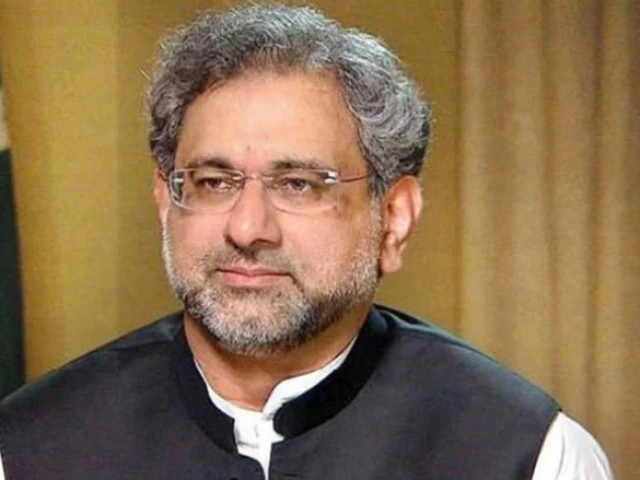Abbasi slams PPP over Karachi's decline, cites 17 years of neglect
During a session at IBA, the former PM raises concerns over the new canals project from the Indus River.

Former prime minister Shahid Khaqan Abbasi, convenor of the Awam Pakistan Party, expressed deep concern over the deteriorating state of Karachi during an interactive session at the Institute of Business Administration (IBA) in Karachi on Wednesday.
Addressing media representatives and students, Abbasi criticised the Pakistan Peoples Party (PPP) for failing to resolve basic civic issues despite holding power in Sindh for the past 17 years.
“After nearly two decades in power, PPP has yet to address fundamental issues like access to clean water. One has to step outside the city center to truly understand how deprived Karachi really is,” Abbasi remarked.
The event featured a special Q&A session with students who engaged with the former premier on topics ranging from governance and political reform to the future direction of Pakistan.
During the session, Abbasi raised concerns over the new canals project from the Indus River. “This is not a new issue. I visited Sukkur in November, and the people were already worried. The federal government has failed to clarify how these canals will affect Sindh’s water share,” he said.
He further criticised both the federal and provincial governments for their inaction and lack of transparency, adding that the public remains anxious while the media remains largely silent. “PPP is now part of the federal government; they cannot disassociate themselves from these issues,” he added.
Calling for accountability, he urged that the Council of Common Interests (CCI) be convened immediately to address these matters openly. “The longer we delay, the more trust we lose between provinces. This lack of clarity is dangerous for national unity.”
Speaking on regional tensions, the former PM condemned India’s recurring strategy of blaming Pakistan for terrorist incidents to gain political advantage, saying such tactics only serve to mask deeper issues.
Referring to a recent tragic event in Indian Illegal Occupied Jammu and Kashmir (IIOJK) , he said, “Over 26 lives were lost. No one should be allowed to attack unarmed civilians.”
Abbasi also highlighted Pakistan’s internal security challenges and spoke about the ongoing issue of missing persons. “To this day, the commission has failed to document these individuals, and the government continues to hide the truth. We owe it to the nation to bring facts to light.”
On the economy, he criticised the government's handling of inflation and agricultural policy. “The farmer is suffering. Wheat procurement has been mismanaged, with prices rising from Rs2200 to Rs4000 per maund. If the farmer fails, the economy fails.”
He also pointed to the lack of transparency in public sector governance, saying the National Accountability Bureau (NAB) has failed to hold politicians and bureaucrats truly accountable. “After 25 years, NAB still makes it seem like every politician is innocent. We need to ask how public officials afford their lifestyles.”
Touching upon electricity shortages and infrastructure gaps in Karachi, Abbasi said, “This is a city where electricity usage peaks between 1 and 5 am. Until Karachi develops, the country cannot progress.”
He argued that meaningful reforms by Pakistan’s three major political parties could drive national progress but lamented their failure to address the public’s real issues. “Today, nearly every opposition party has some level of governance, yet none has emerged as a role model.”
On the subject of democratic values, Abbasi emphasised the need for open political dialogue between politicians and the establishment. “We are still failing to adopt democratic norms. National issues must be discussed transparently with the public, not behind closed doors.”
He concluded by recalling Pakistan’s troubled electoral history. “We saw the country break apart because election results were rejected. Every election has been marred by manipulation. I’ve contested ten elections—no two were ever alike.”
Calling for responsible leadership, he urged ministers to take initiative rather than rely solely on the prime minister for problem-solving. “Good governance means taking responsibility at every level,” he added.




















COMMENTS
Comments are moderated and generally will be posted if they are on-topic and not abusive.
For more information, please see our Comments FAQ